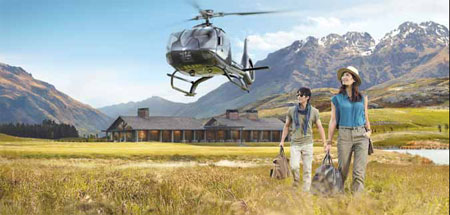
Jack's Point Paradise in New Zealand: Escape to an unspoiled world of dramatic mountains and lake views. More Chinese outbound travellers are choosing natural and historical sites rather than the hustle and bustle of hurried sightseeing. Provided to China Daily
Increasing ratio in top hotels and premium tours
Years ago there was a phrase in the international travel industry describing Chinese tourists - they "sleep cheap, shop expensive".
Even today, shopping still dominates their spending with 34.1 percent of the total while traveling, followed by transportation at 21.6 percent and hotels at 14 percent, according to a report released by the China Tourism Academy in April.
Though still comparatively low, Chinese spending on overseas hotels last year was 4 percentage points higher than that in 2011.
Statistics show that Chinese travelers are becoming more willing to stay in medium-priced star-rated hotels rather than low-budget accommodations.
In 2012, almost half of Chinese tourists stayed in two or three-star international hotel chains, up 10 percentage points over 2011. Some 15 percent were willing to pay for four-star-rated hotels or above, 7 percentage points higher than the year previous.
"The quality of accommodations is tipped as the next big thing," said an industry observer.
But the spending sprees of some Chinese consumers overseas have generated at times eye-popping news even by international standards.
In 2012, Chinese travelers made some 83 million outbound trips, an annual rise of 15 percent. A KPMG study puts the growth at 71 percent this year.
While overseas, they spent $85 billion, double the annual revenue of Exxon Mobil. And 72 percent of these travelers said that they bought luxury items on these trips.
Another report said that of all the luxury spending by Chinese consumers worldwide, a whopping 60 percent happens outside China.
A strong yuan and prohibitively high prices at home are cited as the driving forces for their binge buying overseas.
In the bigger picture, as China grows more affluent more people can afford to travel abroad and more people spend more. But as consumers they have special needs: They require quality services and are at the same time value conscious.
The design of a travel itinerary, attitude and professionalism among tour operators are rated as the decisive reasons in how rich Chinese book luxury travel, according to a report by the China Tourism Academy and leading domestic travel agency Ctrip.
Of the 83 million outbound trips Chinese made last year, more than 92 percent were made for private reasons, unlike the business delegation group tours of years ago paid by sponsors.
And a rising number of Chinese tourists are opting for natural resorts and historic destinations instead of the hustle and bustle of hurried sightseeing.
By 2012, the number of high net worth individuals in China climbed to 700,000, up from 500,000 in 2011 and 320,000 in 2009, according to a study by China Merchants Bank and Bain & Company in May. Such wealthy individuals are defined as those with liquid cash of at least $1 million.
Another wealth report, issued by Citibank in March 2012, said all of Asia has 18,000 ultra high-net-worth people, each with liquidity of at least $100 million, exceeding the number in North America for the first time. The study said there are now 17,000 in North America and 14,000 in Western Europe, signifying a global shift in the economy and fortunes to the East.
Estimates say there will be 26,000 billionaires in Asia by 2016. About 60 percent of them say travel tops their recreational activities.
The South Pole, South America, South and East Africa, Oceania and even outer space are among their luxury travel destinations.
Though Asia is still the most visited locale for outbound Chinese travelers - some 90 percent of the total - per person spending in luxury travel is 10 to 50 times higher than a conventional traveler.
Private jets, cruise liners, luxury hotels, seamless tailor-made transport services, and customized cultural touches throughout the whole trip are major features of luxury travel.
"Especially the affluent are glad to pay for joyful, unforgettable, in-depth and rare experiences," said Liu Deqian, a senior tourism industry expert.
Abercombie & Kent, a global luxury travel service provider, told the Daily Telegraph that "what we're trying to do with China is to try to understand the quirks of that particular nationality and design products that suit their wants and needs".
"Anyone who conquers the Chinese market will really do well," A&K founder Geoffrey Kent told media.
Only 3 percent of the Chinese population now holds a passport. If the ratio increases to 10 percent, the numbers become irresistible to travel companies worldwide.
The China Tourism Academy report says the number of Chinese outbound travelers will increase 15 percent to 94.3 million this year. Their total spending is projected to hit $117.6 billion, a 20 percent surge over 2012.
Exceptional, expensive
When tour is not only about sightseeing and hotels are not just for an overnight stay, the allure of a special experience is increasingly important. Doing something unique gives tourists an incentive to come back.
It is gaining in popularity for the new rich in China as well.
"Reservations for South Pole group tour scheduled at the end of 2013 was full at the beginning of this year," said Wu Zhiyuan with the A&K China office. The 16-day tour - with 10 days spent on the way in and out - costs each of the tour members about 160,000 yuan ($26,052).
"Most of them are couples, wealthy and well-educated, 40 to 50 years old, younger than their counterparts from Europe and the US," said Wu.
She said offering the most knowledgeable and professional private guides is their trump card.

Copyright ©1999-2011 Chinanews.com. All rights reserved.
Reproduction in whole or in part without permission is prohibited.